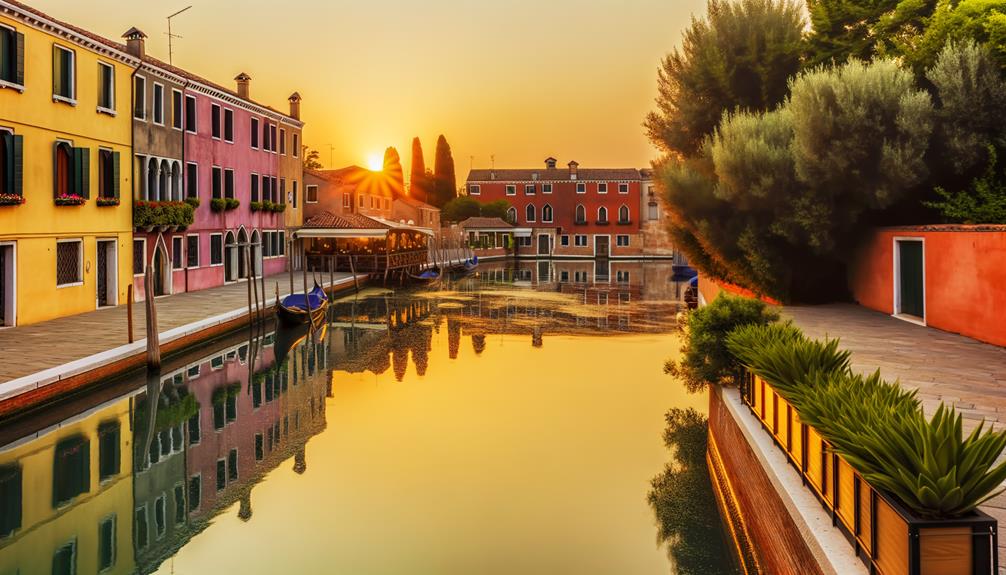Meaning of the Name Venetia
The name Venetia originates from the ancient Latin term 'Venetia,' associated with the Veneti people. Its Indo-European root *wenetoi means 'kin' or 'friendly people.' Venetia, historically significant in the Roman Empire, later became renowned as the Venetian Republic, symbolizing economic prowess and cultural achievement.
Literary works often evoke the name Venetia as a symbol of romantic allure and timeless elegance. The name has been borne by notable figures such as Venetia Burney Phair and Venetia Stevenson.
Understanding the historical and cultural richness behind this name could reveal a deeper appreciation of its legacy.

Key Takeaways
- Venetia originates from the ancient Latin term 'Venetia,' linked to the Veneti people.
- The name's Indo-European root *wenetoi means 'kin' or 'friendly people.'
- Venetia symbolizes timeless elegance, cultural richness, and artistic achievement.
- The name is historically tied to the Venetian Republic's economic and cultural influence.
- Venetia has seen fluctuating popularity, linked to historical interest and literary works.
Origins and Etymology
The name Venetia traces its origins to the ancient Latin term 'Venetia,' which referred to the region inhabited by the Veneti people in northeastern Italy. This nomenclature has deep roots in classical antiquity, stemming from the Indo-European root *wenetoi, meaning 'kin' or 'friendly people.'
The Veneti were known for their seafaring capabilities and strategic trade position along the Adriatic Sea. Linguistically, the term evolved through Romance languages, solidifying its place in Latin texts and later vernaculars. The region's significance in Roman and subsequent European history enhanced the prominence of the name.
In modern usage, Venetia not only denotes a geographical area but also evokes the rich cultural and historical tapestry woven by its original inhabitants.
Historical Context
Understanding the historical context of Venetia involves examining its pivotal role within the Roman Empire and its enduring legacy in European history. Initially a region inhabited by the Veneti, Venetia became a significant part of the Roman Empire after being annexed in the 2nd century BCE.
This area, encompassing modern-day northeastern Italy, was integral due to its strategic location, facilitating trade and military movements. Venetia flourished under Roman rule, contributing significantly to the Empire's economic and cultural development.
Even after the fall of Rome, the region retained its importance, later becoming a vital part of the Byzantine Empire and eventually the Venetian Republic. This historical trajectory underscores Venetia's lasting influence on European political and economic landscapes.
Cultural Significance
Amidst its rich historical background, Venetia's cultural importance is clearly evident through its contributions to art, architecture, and commerce.
The Venetian Republic, often known as La Serenissima, was a crucial maritime power from the 7th century until its decline in 1797. Its strategic location facilitated a thriving trade network, making it a melting pot of various cultures.
Venetian Gothic architecture, seen in buildings like the Doge's Palace, combines Byzantine and Moorish influences, showcasing its extensive commercial connections.
Moreover, the Venetian School of painting, led by artists such as Titian and Tintoretto, had a long-lasting impact on Renaissance art. Therefore, Venetia's cultural heritage stands as a proof of its historical role as a beacon of innovation and artistic accomplishment.
Literary References
Authors and poets have long been captivated by Venetia, weaving its name and essence into numerous literary works that reflect its mystique and historical grandeur. In literature, Venetia often symbolizes a blend of romantic allure and ancient intrigue, serving as a backdrop for tales of love and adventure. The name's storied past and phonetic elegance have inspired a plethora of creative expressions, as seen in the following literary references:
| Literary Work | Author |
|---|---|
| "Venetia" | Benjamin Disraeli |
| "The Stones of Venice" | John Ruskin |
| "Venetia and Other Stories" | Georgette Heyer |
These works exemplify how Venetia's timeless charm continues to resonate within the literary canon, enriching narratives with its evocative heritage.
Famous Namesakes
Renowned individuals bearing the name Venetia have left indelible marks across various fields, from literature and science to politics and the arts.
Venetia Burney Phair, a British schoolgirl, famously named the dwarf planet Pluto in 1930, showcasing her early intellect and curiosity in astronomy.
In the arts, Venetia Stevenson, an American actress and model, gained prominence in the 1950s, symbolizing the allure and talent of Hollywood's golden era.
Political domains also saw influence from Venetia Stanley, a notable British socialite and confidante of Prime Minister H.H. Asquith during World War I, whose extensive correspondence shed light on wartime politics.
These distinguished namesakes exemplify the diverse contributions of individuals named Venetia, underscoring the name's historical and cultural significance.
Modern Usage
Building upon the historical legacy of notable figures, the name Venetia continues to find relevance and charm in contemporary society, reflecting both tradition and modernity.
In today's world, Venetia is embraced for its classical elegance, often chosen by parents seeking a name that embodies cultural richness and timeless appeal. Its usage transcends generational boundaries, appealing to those who appreciate its historical resonance and sophisticated aura.
The name's association with Venice, a city renowned for its artistic heritage and architectural grandeur, further enhances its allure. In literature and media, Venetia frequently appears as a character name, reinforcing its presence in the cultural lexicon.
Consequently, Venetia remains a distinguished choice, bridging past and present with enduring grace.
Regional Variations
The name Venetia exhibits distinct regional variations influenced by historical and cultural contexts. In Italy, its roots trace back to the Roman era and the Venetian Republic, while in Britain, it gained prominence through literary works, most prominently by Benjamin Disraeli.
Contemporary trends reflect a resurgence in its use, adapting to modern naming conventions while retaining its classical charm.
Italian Historical Influences
Influenced by a rich tapestry of historical events and cultural exchanges, the name Venetia reflects the diverse regional variations that have shaped Italy's intricate past.
The evolution of Venetia is emblematic of the confluence of multiple civilizations and periods, each leaving an indelible mark on its identity.
Key influences include:
- Roman Empire: The establishment of Venetia as a strategic province under Roman rule.
- Byzantine Influence: The region's incorporation into the Eastern Roman Empire, enriching its cultural heritage.
- Venetian Republic: The rise of the Venetian Republic, establishing Venice as a powerful maritime republic.
- Austrian Habsburgs: The integration into the Austrian Empire, adding layers of Central European influence.
These influences have interwoven to create the rich historical fabric that defines Venetia.
British Literary Connections
Amidst the cultural tapestry of Venetia, British literary figures have played a significant role in shaping the regional variations of its name, weaving it into the fabric of English literature and popularizing it through their works. Significantly, Venetia Stanley, a muse for poets like Thomas Wyatt, and Venetia Anastasia Digby, immortalized by Sir Kenelm Digby, have embedded the name in literary and historical contexts. These references have enriched the name's cultural resonance, contributing to its nuanced variations across regions.
| Literary Figure | Work | Influence on 'Venetia' |
|---|---|---|
| Thomas Wyatt | Poetry | Popularized through muse Venetia Stanley |
| Sir Kenelm Digby | Biography | Elevated via Venetia Anastasia Digby |
| Georgette Heyer | Historical Romance | Reinforced in popular culture |
| Various British Poets | Various Works | Continued literary prominence |
This intricate interplay underscores the name's enduring appeal.
Modern Usage Trends
Modern naming conventions exhibit a fascinating spectrum of regional variations for the name Venetia, reflecting both historical influences and contemporary trends.
In Italy, the name resonates with cultural pride, often invoking the grandeur of Venice.
British use of Venetia has literary connotations, popularized by Georgette Heyer's novels.
In the United States, Venetia is seen as an exotic and unique choice, appreciated for its rarity.
Meanwhile, in Greece, it has a melodic appeal, aligning with traditional naming patterns.
Symbolism and Meaning
The name Venetia, with its roots in the ancient city of Venice, evokes a sense of timeless elegance and cultural richness. Historically, Venice was a powerful maritime republic, renowned for its art, architecture, and commerce.
The name Venetia encapsulates this heritage, symbolizing sophistication, romance, and artistic achievement. In literature and historical records, Venetia often represents a place of beauty and strategic importance.
The name conveys an aura of intellectual depth and worldly experience, qualities that are highly esteemed in various cultural contexts. Additionally, Venetia's association with the Venetian Lagoon and its intricate network of canals underscores themes of fluidity, connection, and adaptability.
This multifaceted symbolism makes the name Venetia resonate profoundly with those who appreciate historical and cultural depth.
Popularity Trends
Recent decades have witnessed fluctuating popularity trends for the name Venetia, reflecting shifts in cultural preferences and historical awareness. This name, with its rich Venetian heritage, has experienced periods of both favor and obscurity.
Key factors influencing its popularity include:
- Historical Influence: The name's association with the Venetian Republic and its Renaissance legacy.
- Literary References: Increased recognition from classic literature, such as Benjamin Disraeli's novel 'Venetia.'
- Cultural Resurgence: Periodic revivals linked to growing interest in Italian culture and history.
- Celebrity Usage: Instances where public figures or fictional characters named Venetia have brought it into the spotlight.
Understanding these trends provides insights into how historical, cultural, and societal changes shape the use of names over time.
Conclusion
The name Venetia has roots deeply embedded in Latin origins and historical ties to Venice. It carries significant cultural and literary weight. It has seen varied usage across different regions and eras. The name Venetia has been used by artists, writers, and historians to evoke the romanticism and elegance associated with the city of Venice. It has also been a popular choice for parents seeking a unique and meaningful name for their child. In fact, the meaning of the name Tora remains a topic of fascination and debate among name enthusiasts and linguists alike.
Its popularity surged in the 19th century, partially due to Benjamin Disraeli's novel 'Venetia.' According to historical name records, Venetia reached its peak usage in the early 1900s, illustrating its enduring appeal and timeless elegance.






